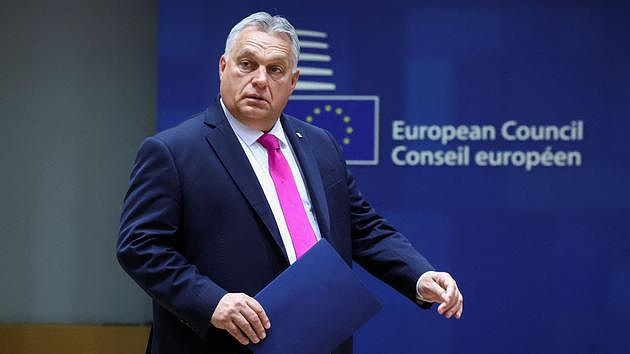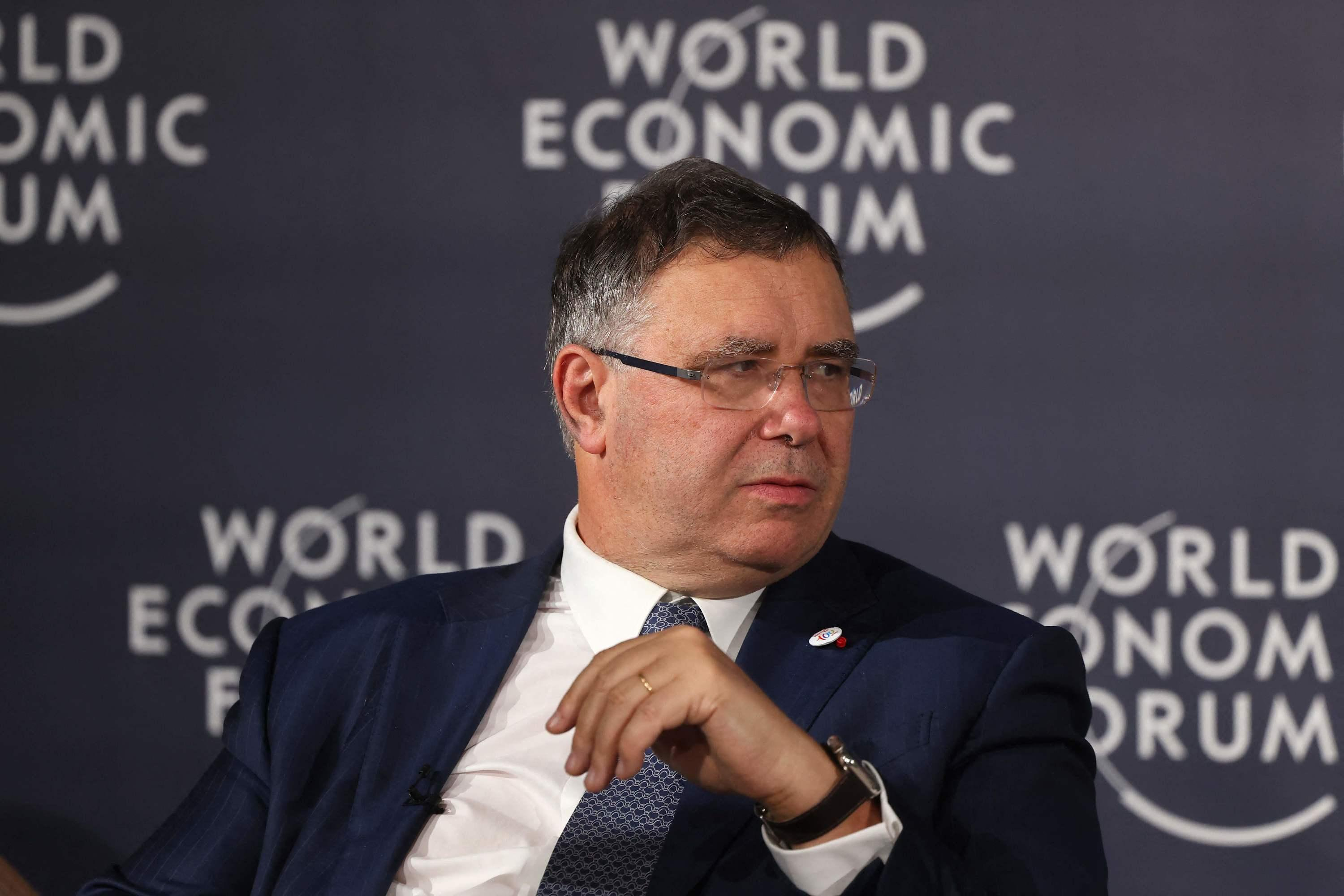It was to be the peak of unconditional and lasting support for Ukraine. Due to Hungarian Viktor Orban's vetoes of the 50 billion euros promised by the EU and the start of EU accession negotiations, the meeting could turn into a fiasco, giving Russian President Vladimir Putin reasons to rejoice.
The Twenty-Seven meet this Thursday in Brussels for a very high-risk European Council, where not a single voice must be missing since the decisions to be taken on Ukraine require, according to the EU treaty, unanimity of the Member States. The President of the Commission, Ursula von der Leyen, highlighted the very serious issues at stake on Wednesday. “We must give Ukraine what it needs to be strong today. So that it will be stronger tomorrow when negotiating a just and lasting peace, she declared. As the war drags on, we must prove what it means to support Ukraine “as long as it takes.” Ukraine is not only fighting against the invader, but also for Europe. Joining our family will be his ultimate victory.”
Orban, on the contrary, demands a strategic discussion on Ukraine between the Twenty-Seven and a substantiated report from the Commission so that everyone can take stock of the challenges posed to the EU by the country at war. Whether it is the formidable financial consequences that the entry of this country would have for the Member States, or the continuation of financial support to kyiv while the war drags on and the Europeans could be abandoned by the Americans .
Many diplomats recognize, without dwelling too much, that Viktor Orban raises the right questions, both to the Twenty-Seven who have never really taken the time to ask them, and to European public opinion. In a poll published this week, Eupinions concluded that 56% of Europeans believe Ukraine should receive financial support “to rebuild the country.” But 59% of those surveyed believe that rebuilding the country will be “an economic burden for the EU,” including 60% in France and 70% in Germany. Some leaders have understood this well and will ensure during the summit - where the difficult mid-term review of the 2021-2027 European budget will be discussed more broadly - that support for Ukraine does not overshadow other priorities. of the EU. For Italian Giorgia Meloni, there is no question of giving up the money promised to fight illegal immigration. Its Slovenian, Austrian and Slovak counterparts are on the same line.
The EU's dual signal - financial and geopolitical - is nevertheless vital for Ukrainian President Volodymyr Zelensky. The 50 billion euros promised over four years by the EU (17 billion in grants and 33 billion in loans) which will allow the Ukrainian state to continue functioning and the country to recover and begin to rebuild - are essential to give visibility to Kiev. According to the IMF, Ukraine risks running out of cash in the first quarter. The international donor also released a new tranche of $900 million at the start of the week. “The Ukrainian economy continues to demonstrate remarkable resilience, although the outlook remains subject to exceptionally high uncertainty linked to the war,” points out the press release published on this occasion.
A green light from the Twenty-Seven to kick off accession negotiations - even accompanied by a new formal confirmation in March 2024 once all the reforms requested by Brussels have been made - is no less important. By strengthening Ukraine's European prospects, the EU would send a new message of firmness to Moscow. While President Zelensky has seen discordant and critical voices rise against him in recent months, obtaining this sesame would strengthen him. Failing that, his opponents could argue that he is the leader of a country abandoned - even deceived - by the West. The pressure is all the greater on the EU as the 20 billion euros in military support pushed by the EU's high representative, Josep Borrell, has already been swept away. And, above all, because the $61 billion package proposed by the White House is still blocked in Congress, despite the Ukrainian president's trip to Washington at the start of the week.
“It has never been worse,” worries a diplomat from a country in the North of the Union. “We will find solutions and it will end up being done,” says another. Alternatives exist, in particular that which would consist of building an agreement with twenty-six member states on financial support for Ukraine and which would politically isolate Hungary. Conversely, there is no other solution than unanimity at the start of the accession discussions. And if Viktor Orban maintains his veto, the new European perspectives expected by Moldova, Georgia and Bosnia-Herzegovina will probably be swept away.
The Hungarian Prime Minister, close to Putin, has been increasing his excesses for months. He initially cast doubt on these intentions, pleading in November for a readjustment of EU support for Ukraine. Last week, in a letter addressed to the President of the European Council, Charles Michel, he threatened a veto. “I respectfully urge you not to invite the European Council to take a decision on these issues in December, because the obvious lack of consensus would lead to failure,” he warned. Neither the Commission's announcement to release 10 billion of the 30 billion in European funds withheld by Brussels to encourage the illiberal Hungarian government to bring the country up to European standards, nor the political pressure exerted on the strong man of Budapest made him move.
The trip by the President of the European Council to Budapest – described as a “suicide mission” by a European diplomat – achieved nothing. Just like the dinner to which Orban was invited last week at the Élysée. Among other European leaders, the Spaniard Pedro Sanchez - his country currently holds the rotating presidency of the EU - and the Estonian Kaja Kallas also failed. On Wednesday, Paris and Berlin increased the pressure. “I will advocate for sustainable and reliable financial support for Ukraine in the years to come,” declared Chancellor Olaf Scholz, while Emmanuel Macron called on the EU to be “there to support and to Ukraine”. “There is hardly anyone other than Donald Trump who could change his mind,” quips Fabrice Pothier, managing director of Rasmussen Global, a company which advises Kiev, in reference to the agreement between the Hungarian prime minister and the former president of the United States.
In reality, European capitals are perplexed. Orban is, of course, not an easy leader to handle. But he always gave up, once more money or benefits were extracted from the EU. Not this time. Even if the spokesperson for the strong man of Budapest muddied the waters on Tuesday evening by indicating that Hungary could agree to lift its veto on the 50 billion euros to Ukraine if his country obtained the release of the entire of the 30 billion retained by Brussels – he knows it’s impossible at this stage.
Orban's opposition goes well beyond money issues. Less than six months before the European elections, while far-right movements are on the rise in Europe, the person concerned seems to consider that a new wind is blowing. “My project,” he explained on Wednesday, “is not to leave the EU, but to take back Brussels. So my idea is not that Hungary stays away, away from the outer circle, but that it goes inwards.

 B:SM will break its investment record this year with 62 million euros
B:SM will break its investment record this year with 62 million euros War in Ukraine: when kyiv attacks Russia with inflatable balloons loaded with explosives
War in Ukraine: when kyiv attacks Russia with inflatable balloons loaded with explosives United States: divided on the question of presidential immunity, the Supreme Court offers respite to Trump
United States: divided on the question of presidential immunity, the Supreme Court offers respite to Trump Maurizio Molinari: “the Scurati affair, a European injury”
Maurizio Molinari: “the Scurati affair, a European injury” Irritable bowel syndrome: the effectiveness of low-carbohydrate diets is confirmed
Irritable bowel syndrome: the effectiveness of low-carbohydrate diets is confirmed Beware of the three main sources of poisoning in children
Beware of the three main sources of poisoning in children First three cases of “native” cholera confirmed in Mayotte
First three cases of “native” cholera confirmed in Mayotte Meningitis: compulsory vaccination for babies will be extended in 2025
Meningitis: compulsory vaccination for babies will be extended in 2025 Thanks to intelligent cameras, RATP will indicate the least crowded trains on line 14
Thanks to intelligent cameras, RATP will indicate the least crowded trains on line 14 Dubai begins the transformation of Al-Maktoum to make it the future “largest airport in the world”
Dubai begins the transformation of Al-Maktoum to make it the future “largest airport in the world” When traveling abroad, money is a source of stress for seven out of ten French people
When traveling abroad, money is a source of stress for seven out of ten French people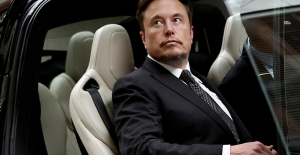 Elon Musk arrives in China to negotiate data transfer and deployment of Tesla autopilot
Elon Musk arrives in China to negotiate data transfer and deployment of Tesla autopilot Two people arrested for attempted damage to classified property at the Musée d’Orsay
Two people arrested for attempted damage to classified property at the Musée d’Orsay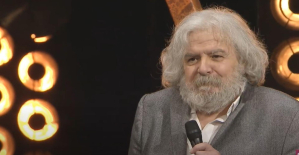 Death of composer Jean Musy, at 76, author of the music of Papy fait de la resistance, Les Champs-Élysées
Death of composer Jean Musy, at 76, author of the music of Papy fait de la resistance, Les Champs-Élysées Fanny Ardant prodigious in The Wound and the Thirst
Fanny Ardant prodigious in The Wound and the Thirst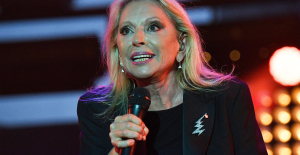 Hospitalized for pneumonia, Véronique Sanson cancels her concert in Nantes
Hospitalized for pneumonia, Véronique Sanson cancels her concert in Nantes Skoda Kodiaq 2024: a 'beast' plug-in hybrid SUV
Skoda Kodiaq 2024: a 'beast' plug-in hybrid SUV Tesla launches a new Model Y with 600 km of autonomy at a "more accessible price"
Tesla launches a new Model Y with 600 km of autonomy at a "more accessible price" The 10 best-selling cars in March 2024 in Spain: sales fall due to Easter
The 10 best-selling cars in March 2024 in Spain: sales fall due to Easter A private jet company buys more than 100 flying cars
A private jet company buys more than 100 flying cars This is how housing prices have changed in Spain in the last decade
This is how housing prices have changed in Spain in the last decade The home mortgage firm drops 10% in January and interest soars to 3.46%
The home mortgage firm drops 10% in January and interest soars to 3.46% The jewel of the Rocío de Nagüeles urbanization: a dream villa in Marbella
The jewel of the Rocío de Nagüeles urbanization: a dream villa in Marbella Rental prices grow by 7.3% in February: where does it go up and where does it go down?
Rental prices grow by 7.3% in February: where does it go up and where does it go down? Europeans: a senior official on the National Rally list
Europeans: a senior official on the National Rally list Blockade of Sciences Po: the right denounces a “drift”, the government charges the rebels
Blockade of Sciences Po: the right denounces a “drift”, the government charges the rebels Even on a mission for NATO, the Charles-de-Gaulle remains under French control, Lecornu responds to Mélenchon
Even on a mission for NATO, the Charles-de-Gaulle remains under French control, Lecornu responds to Mélenchon “Deadly Europe”, “economic decline”, immigration… What to remember from Emmanuel Macron’s speech at the Sorbonne
“Deadly Europe”, “economic decline”, immigration… What to remember from Emmanuel Macron’s speech at the Sorbonne These French cities that will boycott the World Cup in Qatar
These French cities that will boycott the World Cup in Qatar Mercato: Fonseca coach of AC Milan? The Lille coach speaks
Mercato: Fonseca coach of AC Milan? The Lille coach speaks Ligue 1: OM with a three-way defense, Lens changes almost nothing
Ligue 1: OM with a three-way defense, Lens changes almost nothing Ligue 1: PSG officially crowned champion of France for the 12th time
Ligue 1: PSG officially crowned champion of France for the 12th time Ligue 1: Lyon offers Monaco and gets closer to a European place
Ligue 1: Lyon offers Monaco and gets closer to a European place